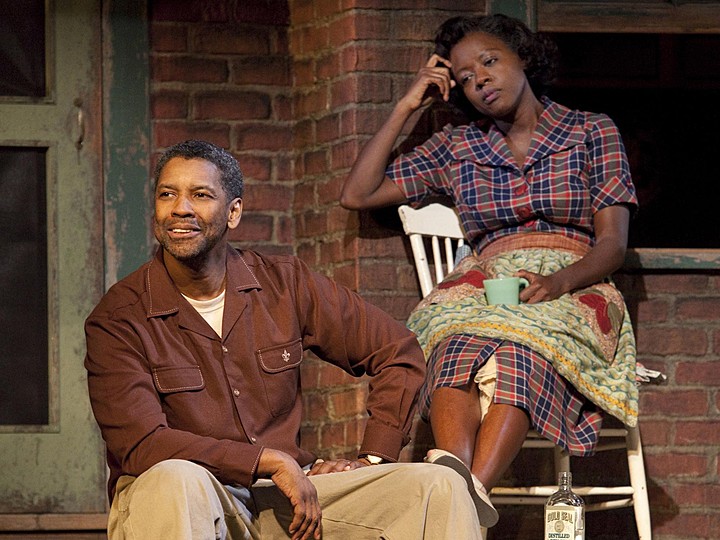Having demonstrated their marriage on a good day, Fences proceeds to show some bad days. Under every personal asset of Troy's rests contamination brought by his discontentment and regret. He's often at odds with his two sons, one from a previous marriage and one with Rose. The older son, Lyons (Russell Hornsby), is a struggling musician who reliably shows up on payday to ask for money. As passionate about music as he is unashamed to ask for a handout, he's a living reminder that Troy is not doing what he loves, and what he loved doing (baseball) has long passed him by. The younger son, Cory (Jovan Adepo), is as talented as his old man claims to be, but Troy discourages him both because he doesn't want his son to have the same disappointment but also because he doesn't want to be shown up by his offspring, predictably causing teenage Cory to resent his father and buck under his authority. He's not faithful to Rose out of a desire to feel young again, and he's seeking a promotion that would mean more money but make him less happy, as it would separate him from Bono. Finally, the house he's so proud of owning is actually paid for by disability checks that Troy siphons from his brother Gabriel (Mykelti Williamson), mentally disabled in WWII.
It's with the character of Gabriel that Fences most encounters dramatic trouble. Williamson is doing what he can with a role that requires him to play a mentally disabled man. It's off-putting, and he's often used as comic relief that is somewhat kind-hearted, but comic relief nonetheless. He's a necessary specter of Troy's dissatisfaction, but there might have been a better representation. Fences is also minimally filmed out of deference to the play, with only a handful of sets and no directorial flourish.
The workmanlike directing allows the acting to take center stage. Practiced hands at the characters, Washington and Davis are unsurprisingly excellent. He seems to have put on weight for the role, giving him heft to go along with his looming presence. Troy is a loquacious man, and Denzel spits his lines with agitation and ferocity, always on the offensive against parties in his life that should be allies. Davis does her usual snot-acting in a scene, but she's also relaxed and at ease around Troy's storminess, like she knows what to expect and she knows how to defuse it. She's expressive and kind with everyone that walks through her door and sits on her porch, and she and Denzel form a beautiful onscreen partnership.
Lastly, a play about a black working class family by a premier playwright and one of the great film icons, black or otherwise, is going to be both suffused with race and ideally transcendent of it. It's notable how often the Maxson's talk about race, especially in comparison to this white person who does not have many conversations about it and has even less with family members. Troy especially is always thinking about who's getting one over on him, and because he's a proud man, every slight must have been racism and not a personal failing on his part. No matter his pride, he is a man whose life has been altered by discrimination, and the sting of that disappointment means he wants to protect his children from that. For Cory, that means teaching him to not aim too high, such that anytime Cory shoots for something better, he's being disobedient. Fences reaches the universal when it portrays a father who wants his child to surpass him, but then also resents him for it, a dynamic that surely afflicts many no matter their race.
Plays adapted into films are going to have their limitations, and Fences is no exception. However, Wilson's script still rings out as a true representation of working class life. Led by two of the greatest actors of today, it's a can't miss exercise, though I would imagine the ideal setting is on stage. B

 RSS Feed
RSS Feed